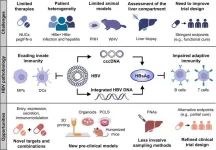(Press-News.org) Deepak Srivastava, MD, president of Gladstone Institutes and a renowned cardiovascular researcher, took the stage on Saturday in Philadelphia to receive the American Heart Association’s Distinguished Scientist award—joining a preeminent group of scientists and clinicians who’ve earned the association’s highest honor over the past decade.
The American Heart Association applauded Srivastava for his significant, original, and sustained scientific contributions that have advanced the association’s mission: “To be a relentless force for a world of longer, healthier lives.”
“We live in an exponential phase of discovery and intervention for human disease, and I’m grateful to be able to contribute to this body of knowledge through my work as a scientist and as the leader of Gladstone Institutes,” says Srivastava, who also serves as a senior investigator at Gladstone and director of the institute’s Roddenberry Stem Cell Center. “I’m honored to receive the American Heart Association’s Distinguished Scientist award and stand among my fellow awardees who are redefining what’s possible in treating disease.”
In addition to his many leadership roles at Gladstone, Srivastava is a professor of Pediatrics and of Biochemistry & Biophysics at the UC San Francisco (UCSF) Medical Center. He holds the Robert W. and Linda Mahley Distinguished Professorship.
At Gladstone, Srivastava’s laboratory has led the way in understanding gene networks that guide development of the heart—and how changes in these pathways can lead to congenital heart disease. Through his many discoveries, he and his team have deciphered new ways to generate cardiac cells that repair heart damage and translated these findings into novel approaches for treating disease. Some of these discoveries are now in clinical trials.
“Deepak’s pioneering research has led to important breakthroughs that may one day help millions of patients every year, as congenital heart malformations continue to be the most common human birth defect and cardiovascular disease remains the world’s leading cause of death,“ says Benoit Bruneau, PhD, a Gladstone senior investigator and director of the Gladstone Institute of Cardiovascular Disease. “The heart is a vital organ, and that is why it is such a vital focus for us at Gladstone.”
Srivastava holds a BS from Rice University and an MD from University of Texas. He trained in pediatrics at UCSF and in pediatric cardiology at the Children’s Hospital of Harvard Medical School. Before joining Gladstone in 2005, Srivastava served as a professor in the Departments of Pediatrics and Molecular Biology at the University of Texas Southwestern Medical Center in Dallas. He is a former president of the International Society for Stem Cell Research and is a member of the American Society for Clinical Investigation, the American Academy of Arts and Sciences, the American Association for the Advancement of Science, and the National Academy of Medicine.
“I see a future where we’ll be using today’s advances in genetics, artificial intelligence, and other scientific fields to quickly identify and actually cure diseases,” Srivastava says. “It’s impossible to not be excited about this revolution in medicine, fueled by some of the brightest minds that I have had the privilege of working with. At Gladstone, this is the future we’re working toward, and I have never been more hopeful.”
The American Heart Association presented Srivastava and five other awardees with the Distinguished Scientist Award during its 2023 Scientific Sessions conference in Philadelphia, which marked the 10th year of the awards. With more than $5 billion invested in research, the association is the largest not-for-profit funding source for cardiovascular and cerebrovascular disease research, next to the federal government.
END
American Heart Association honors Gladstone President Deepak Srivastava with Distinguished Scientist Award
The award recognizes leaders who have made major contributions to the fields of cardiovascular and stroke science
2023-11-13
ELSE PRESS RELEASES FROM THIS DATE:
Second-most distant galaxy discovered using James Webb Space Telescope
2023-11-13
The second- and fourth-most distant galaxies ever observed have been discovered in a region of space known as Pandora’s Cluster, or Abell 2744, using data from NASA’s James Webb Space Telescope (JWST). Following up on a deep field image of the area, an international team led by Penn State researchers confirmed the distance of these ancient galaxies and inferred their properties using new spectroscopic data — information about light emitted across the electromagnetic spectrum — from JWST. At nearly 33 billion light years away, these incredibly distant ...
Researchers explore origins of lupus, find reason for condition’s prevalence among women
2023-11-13
For years, researchers and clinicians have known that lupus, an autoimmune condition, occurs in women at a rate nine times higher than in men. Some of the factors that cause the disease’s high prevalence in women have eluded discovery, but in a new study investigating the immune system processes in lupus and the X chromosome, Johns Hopkins Medicine researchers have uncovered answers about the disease’s frequency in females.
A number of dysregulated genetic and biological pathways contribute to the development of lupus and its varied symptoms of muscle and joint pain, ...
Capture or reuse CO2 as a chemical source for the production of sustainable plastics
2023-11-13
A scientific team has developed a new polyurethane production technique using CO2 to create new types of easily recyclable plastics. The study, published in the Journal of the American Chemistry Society (J.A.C.S.), could provide a solution for the development of truly sustainable plastics.
Commodity plastics have transformed global industry. Whether in construction, clothing, vehicles or food packaging, these plastics are everywhere in our daily lives, so much so that their global use has been estimated at around 460 million tons in 2019. This number is staggering, but not surprising, because plastics, also known as synthetic polymers, have met a large ...
Self-deception may seed ‘hubris balancing,’ leading to Putin’s war against Ukraine
2023-11-13
Strategy underlies the affairs of national leaders, including how they view and interact with other states — but what if such strategy is borne of self-deception? That’s the thrust of a novel international relations theory that Ryuta Ito of Hiroshima University has now expanded upon, providing psychological rationalization to explain the irrational acts of national leaders at war.
Ito penned his reasoning on Sept. 5 in the journal International Affairs.
“Why did Vladimir Putin decide to invade Ukraine in 2022?” asked Ito, assistant professor in the Graduate School of Humanities and Social Sciences at Hiroshima University. ...
Appropriate statin prescriptions increase sixfold with automated referrals
2023-11-13
PHILADELPHIA— The odds of prescribing the appropriate dose of statins—a medicine used to lower “bad” cholesterol levels—increased sixfold when automated referrals were made to pharmacy services, instead of relying on traditional prescribing methods, according to researchers at the Perelman School of Medicine at the University of Pennsylvania. More than 90 million people in the U.S. use statins, making it one of the most prescribed medications in the county. Despite their effectiveness in lowering cholesterol levels and the risk of cardiovascular ...
When keeping secrets could brighten your day
2023-11-13
Though people often want to share good news as soon as they learn it, a study published by the American Psychological Association has found that keeping good news a secret before telling someone else could make people feel more energized and alive.
“Decades of research on secrecy suggest it is bad for our well-being, but this work has only examined keeping secrets that have negative implications for our lives. Is secrecy inherently bad for our well-being or do the negative effects of secrecy tend to stem from keeping negative secrets?” asked lead author Michael ...
It takes a village: Hunter-gatherer approach to childcare suggests that the key to mother and child wellbeing may be many caregivers
2023-11-13
Infants and toddlers may be psychologically wired to thrive with high levels of “sensitive care” and personal attention, according to a study conducted with contemporary hunter-gatherer societies.
Research led by an evolutionary anthropologist at Cambridge University found that hunter-gatherer infants receive attentive care and physical contact for about nine hours per day from up to 15 different caregivers.
Dr Nikhil Chaudhary says that, for the vast majority of our species’ evolutionary history, ...
The American Pediatric Society announces its new members for 2023
2023-11-13
The American Pediatric Society (APS) is pleased to announce eighty-four new members. Founded in 1888, the APS is North America's first and most prestigious academic pediatric organization. New members will be recognized during the APS Presidential Plenary at the Pediatric Academic Societies 2024 Meeting.
APS members are recognized child health leaders of extraordinary achievement who work together to shape the future of academic pediatrics. Current members nominate new members by recognizing individuals who have distinguished themselves as child health leaders, ...
Reviewing new challenges and opportunities for hepatitis B cures
2023-11-13
Hepatitis B virus (HBV) is a significant public health problem, with over 296 million people chronically infected worldwide. Despite the availability of a safe and effective vaccine for over 40 years, HBV remains a leading cause of liver disease and death.
One of the main challenges to curing HBV is the unique biology of the virus. HBV replicates through a covalently closed circular DNA (cccDNA) intermediate integrated into the host genome. This makes it very difficult to eradicate the virus completely, even with effective antiviral therapy. Another challenge is the impaired immune response to HBV in chronically infected individuals. The virus has evolved several mechanisms to evade ...
AI faces look more real than actual human face
2023-11-13
White faces generated by artificial intelligence (AI) now appear more real than human faces, according to new research led by experts at The Australian National University (ANU).
In the study, more people thought AI-generated white faces were human than the faces of real people. The same wasn’t true for images of people of colour.
The reason for the discrepancy is that AI algorithms are trained disproportionately on white faces, Dr Amy Dawel, the senior author of the paper, said.
“If white AI faces are consistently perceived as more realistic, this technology could have serious implications for people of colour by ultimately reinforcing ...
LAST 30 PRESS RELEASES:
ASU researchers to lead AAAS panel on water insecurity in the United States
ASU professor Anne Stone to present at AAAS Conference in Phoenix on ancient origins of modern disease
Proposals for exploring viruses and skin as the next experimental quantum frontiers share US$30,000 science award
ASU researchers showcase scalable tech solutions for older adults living alone with cognitive decline at AAAS 2026
Scientists identify smooth regional trends in fruit fly survival strategies
Antipathy toward snakes? Your parents likely talked you into that at an early age
Sylvester Cancer Tip Sheet for Feb. 2026
Online exposure to medical misinformation concentrated among older adults
Telehealth improves access to genetic services for adult survivors of childhood cancers
Outdated mortality benchmarks risk missing early signs of famine and delay recognizing mass starvation
Newly discovered bacterium converts carbon dioxide into chemicals using electricity
Flipping and reversing mini-proteins could improve disease treatment
Scientists reveal major hidden source of atmospheric nitrogen pollution in fragile lake basin
Biochar emerges as a powerful tool for soil carbon neutrality and climate mitigation
Tiny cell messengers show big promise for safer protein and gene delivery
AMS releases statement regarding the decision to rescind EPA’s 2009 Endangerment Finding
Parents’ alcohol and drug use influences their children’s consumption, research shows
Modular assembly of chiral nitrogen-bridged rings achieved by palladium-catalyzed diastereoselective and enantioselective cascade cyclization reactions
Promoting civic engagement
AMS Science Preview: Hurricane slowdown, school snow days
Deforestation in the Amazon raises the surface temperature by 3 °C during the dry season
Model more accurately maps the impact of frost on corn crops
How did humans develop sharp vision? Lab-grown retinas show likely answer
Sour grapes? Taste, experience of sour foods depends on individual consumer
At AAAS, professor Krystal Tsosie argues the future of science must be Indigenous-led
From the lab to the living room: Decoding Parkinson’s patients movements in the real world
Research advances in porous materials, as highlighted in the 2025 Nobel Prize in Chemistry
Sally C. Morton, executive vice president of ASU Knowledge Enterprise, presents a bold and practical framework for moving research from discovery to real-world impact
Biochemical parameters in patients with diabetic nephropathy versus individuals with diabetes alone, non-diabetic nephropathy, and healthy controls
Muscular strength and mortality in women ages 63 to 99
[Press-News.org] American Heart Association honors Gladstone President Deepak Srivastava with Distinguished Scientist AwardThe award recognizes leaders who have made major contributions to the fields of cardiovascular and stroke science




